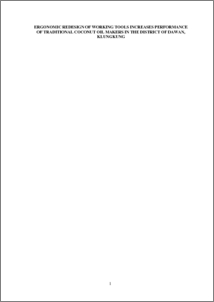Dr. Drs. I Made Gede , Arimbawa, M.Sn
(2011)
Ergonomic Redisign Of Working Tools Increases Performance Of Traditional Coconut Oil Makers In The District Of Dawan, Klungkung.
Documentation.
ISI Denpasar.
![[img]](http://repo.isi-dps.ac.id/style/images/fileicons/application_pdf.png)  Preview |
|
PDF (Cover Ergonomic Redisign Of Working Tools Increases Performance Of Traditional Coconut Oil Makers In The District Of Dawan, Klungkung)
- Cover Image
Download (3kB)
| Preview
|
Abstract
Abstract
The business of producing coconut oil in the district of Dawan, Klungkung is one example of small-scale home industries in the rural area. The level of working productivity of the oil makers can be categorized as relatively low, as viewed from the aspect of the following indicators: (a) level of working burden, (b) musculoskeletal complaints, (c) level of fatigue or tiredness, and (d) level of productivity. One factor that causes the low productivity is the fact that the working tools used in this industry are non-ergonomically designed such as: (1) tool for peeling off the coconut fibers, (2) tool for taking the coconut flesh, (3) tool for grating the coconut flesh, (4) tool for extracting milk from the water-mixed grated coconut, (5) stove for boiling the coconut milk. Based on the above problems background, it is necessary to make more ergonomic new design or redesign of the tools that are used by the coconut oil makers in the district of Dawan in order to increase their working performance or productivity.
This research was carried out using treatment by subject design by comparing before and after treatment involving 22 female subjects selected by simple random method from all female coconut oil makers in the studied area. Before treatment the research subjects were asked to make coconut oil as usual with their traditional tools. After an interval of washing out period was given, the subjects entered the treatment phase in which they were asked to make coconut oil by using the tools already redesigned ergonomically. The data obtained from the research were analyzed by t-paired test at a significance level of 5%.
Results of the analysis showed as follows: (1) average of working heart rate before treatment was 108.49 ± 0.95 pulse /minute and after treatment 91.92 ± 1.91 pulse /minute, indicating a decrease of workload from moderate to mild one (decrease of working heart rate of 16.59 pulse/minute or 14.69%); (2) average of musculoskeletal complaints before treatment was 51.73 ± 1.36 and after treatment 36.79 ± 0.83 (a decrease of 14.94 or 26.17%); (3) average of fatigue before treatment was 66.75 ± 3.60 and after treatment 49.50 ± 3.28 (a decrease of 17.19 or 25.83%); (4) average of working productivity before and after treatment was 35.86 ± 1.09 and 48.66 ± 1.10, respectively (an increase of 12.81 or 35.71%). Based on evaluation of investment yield, the NVP value in a five-year period Rp. 11.503.431,- > 0, PBP 9.22 months > 0, and RoI 32.54 > 13% (rate of interest commonly applied in 2008).
It is concluded that redesign of working tools to be more ergonomic has proven to be able to increase the working performance of coconut oil makers and hence worth investing. Novelty of this research is in the positive results related to ergonomic redesigning of the tools for making coconut oil in the district of Dawan, Klungkung by approaches to being systemic, holistic, interdisciplinary, participatory, and appropriate technology usage. Further studies on similar related working issue should focus on the aspects of working environment, especially on how to overcome smoke pollutant in the kitchen area, on more proper work station and working organization or on that related to production quality of the coconut oil by generating maximally all the potential already in existence among the local traditional coconut oil makers.
Keywords: redesign; working tools; ergonomic; working performance
Actions (login required)
 |
View Item |


